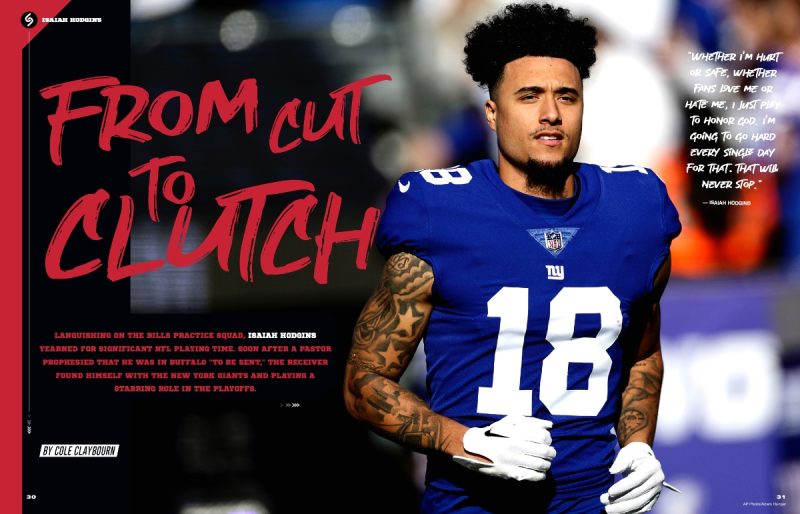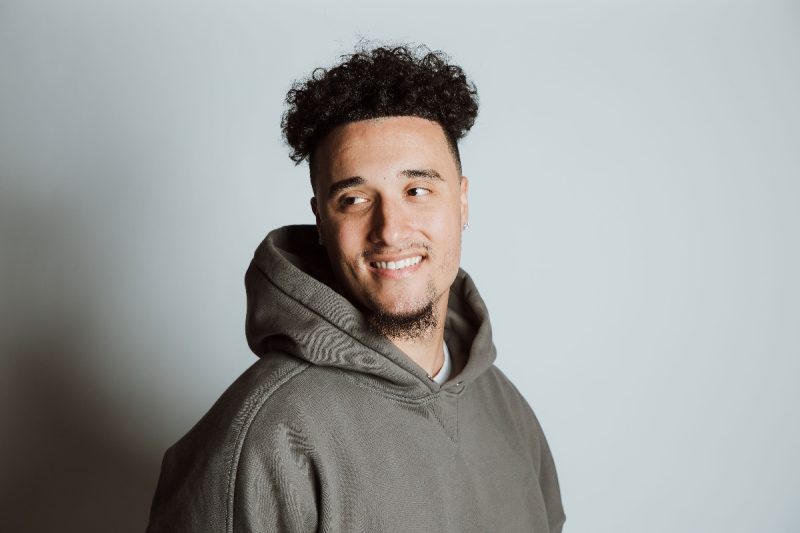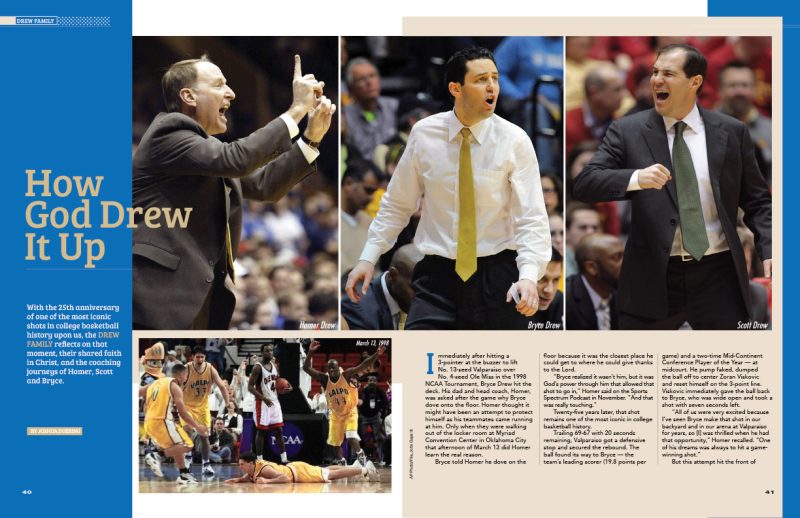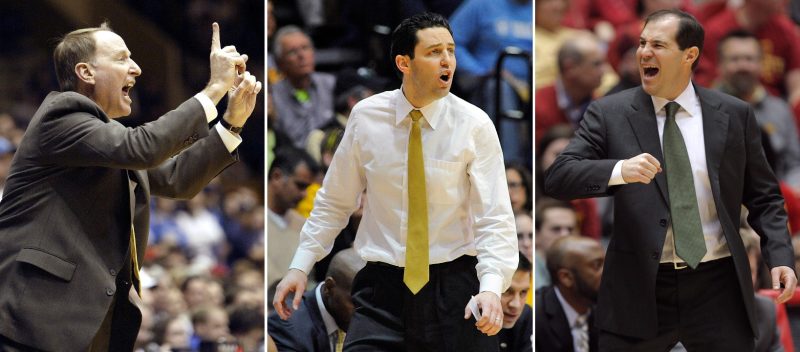This story appears in the Fall 2021 issue of Sports Spectrum Magazine. To read more in-depth feature stories like it, subscribe to our quarterly magazine for only $18.
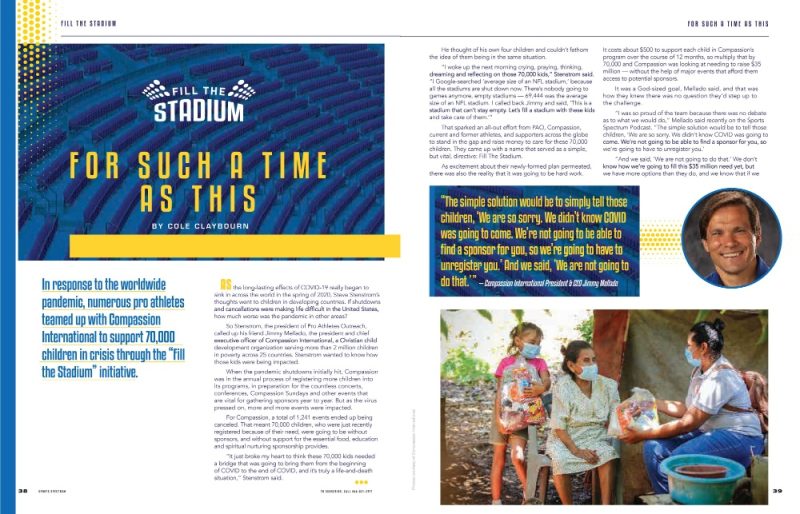
Fall 2021 issue
In response to the worldwide pandemic, numerous pro athletes teamed up with Compassion International to support 70,000 children in crisis through the “Fill the Stadium” initiative.
***
As the long-lasting effects of COVID-19 really began to sink in across the world in the spring of 2020, Steve Stenstrom’s thoughts went to children in developing countries. If shutdowns and cancellations were making life difficult in the United States, how much worse was the pandemic in other areas?
So Stenstrom, the president of Pro Athletes Outreach, called up his friend Jimmy Mellado, the president and chief executive officer of Compassion International, a Christian child development organization serving more than 2 million children in poverty across 25 countries. Stenstrom wanted to know how those kids were being impacted.
When the pandemic shutdowns initially hit, Compassion was in the annual process of registering more children into its programs, in preparation for the countless concerts, conferences, Compassion Sundays and other events that are vital for gathering sponsors year to year. But as the virus pressed on, more and more events were impacted.
For Compassion, a total of 1,241 events ended up being canceled. That meant 70,000 children, who were just recently registered because of their need, were going to be without sponsors, and without support for the essential food, education and spiritual nurturing sponsorship provides.
“It just broke my heart to think these 70,000 kids needed a bridge that was going to bring them from the beginning of COVID to the end of COVID, and it’s truly a life-and-death situation,” Stenstrom said.
He thought of his own four children and couldn’t fathom the idea of them being in the same situation.
“I woke up the next morning crying, praying, thinking, dreaming and reflecting on those 70,000 kids,” Stenstrom said. “I Google-searched ‘average size of an NFL stadium,’ because all the stadiums are shut down now. There’s nobody going to games anymore, empty stadiums — 69,444 was the average size of an NFL stadium. I called back Jimmy and said, ‘This is a stadium that can’t stay empty. Let’s fill a stadium with these kids and take care of them.’”
That sparked an all-out effort from PAO, Compassion, current and former athletes, and supporters across the globe to stand in the gap and raise money to care for these 70,000 children. They came up with a name that served as a simple, but vital, directive: Fill The Stadium.
As excitement about their newly-formed plan permeated, there was also the reality that it was going to be hard work. It costs about $500 to support each child in Compassion’s program over the course of 12 months, so multiply that by 70,000 and Compassion was looking at needing to raise $35 million — without the help of major events that afford them access to potential sponsors.
It was a God-sized goal, Mellado said, and that was how they knew there was no question they’d step up to the challenge.
“I was so proud of the team because there was no debate as to what we would do,” Mellado said recently on the Sports Spectrum Podcast. “The simple solution would be to tell those children, ‘We are so sorry. We didn’t know COVID was going to come. We’re not going to be able to find a sponsor for you, so we’re going to have to unregister you.’
“And we said, ‘We are not going to do that.’ We don’t know how we’re going to fill this $35 million need yet, but we have more options than they do, and we know that if we unregister them, we know what we’re sending them and their family to. And that is not going to happen.
“So, we stepped out in faith and said we’re not going to unregister, and still have not unregistered, a single child.”
***
“The simple solution would be to simply tell those children, ‘We are so sorry. We didn’t know COVID was going to come. We’re not going to be able to find a sponsor for you, so we’re going to have to unregister you.’ And we said, ‘We are not going to do that.’” — Compassion International President Jimmy Mellado
***
The reality for many of the families Compassion cares for is that the pandemic left them with two difficult options: work and risk catching the virus, passing it to family members, and possibly dying; or shelter in place, not work, and struggle to get food. It was a scenario that Richmond Wandera, a pastor in Kampala, Uganda, saw playing out far too often.
“The key to this whole conversation is the question of food,” he said early on during the pandemic. “The number of families that are starving as a result of this lockdown is incredible. We have about 300,000 small businesses and roadside retail people whose businesses have been shut down.”
Compassion’s global response to the pandemic prioritized providing food for children, but it didn’t stop there.
“Once we go to the family and provide them food, you can’t just feed the registered kid because you’ve got the brother and the sister and the dad and the mom that are there,” Mellado said. “So we took responsibility for not only taking care of 2.2 million children in our program, but in fact taking care of 8.3 million people, including their extended families.”
As the pandemic raged on across the globe, Mellado felt like news coverage didn’t focus enough on what was happening in developing nations. As western countries and other more developed areas began to open up again this summer, countries like Uganda and Guatemala are struggling to get to a 20-percent vaccination rate, he said.
And while many countries begin to slowly climb out of the financial hole the pandemic caused, Mellado said it’s a much different reality for the countries that Compassion serves. He said the World Bank is estimating that 150 million people are going to be thrust back into extreme poverty, living on just $1.90 a day. In many countries, more than half of the population will be living in poverty.
To add even more layers to it, when shutdowns took place in some of these developing countries, that meant in-person school was canceled. With no Internet, there was no online or hybrid school option like in the United States. With children being forced to shelter in place, that also meant the chances for domestic abuse and child abuse significantly increased without the chance for the children to seek help. So Compassion has also provided child-protection training.
“The people that pay the most are the children. The defenseless, the most vulnerable, they’re the ones that pay,” Mellado said. “So we’re providing emotional support to the leaders and the families, and training around child protection so that, when tempers flare, kids don’t pay.”
That’s what has made the Fill The Stadium initiative so important. And Compassion is uniquely set up to mobilize for such a time as this, as it can rely on its 8,000-plus international church partners.
“In many of these places, we were able to pivot and mobilize to serve the communities immediately, whereas governments took time to mobilize and begin to try to serve all the communities,” Mellado said. “Then the under-resourced communities weren’t the first ones being served. Those were our first ones to be served. So the resources that you provide go right to that local community where the hurt is the greatest.”
***
“God clearly sees these 70,000 kids and loves them far more than we ever could. He’s invited us into the story He’s telling to give them food, and to protect them, and to protect their families. … And hopefully, they meet Him as a result of that connection.” — Pro Athletes Outreach President Steve Stenstrom
***
The Fill the Stadium campaign estimated that a typical game-day experience for an NFL game would cost a family of four around $541. The idea was that, since many stadiums weren’t allowing any fans for a while, families take the money they would’ve spent on seats at a game and use it to help a child in crisis.
It was a big task. A lot of money. A lot of work. But it was met with a lot of people with big hearts willing to open their checkbooks. The first person Mellado reached out to was New York Giants left tackle Nate Solder. Almost immediately, Solder and his wife, Lexi, pledged $1 million to support 2,000 families.
Not long after, Chris Davis of the Baltimore Orioles and his wife, Jill, pledged a similar donation. “Then it just started taking off from there,” Mellado said. Current and former athletes from numerous sports joined in, along with many others who donated once they got word of the movement.
For Solder, the literal empty stadiums convicted him. He sat out the 2020 season to stay home and care for his son, Hudson, who is battling cancer. When Solder watched football games on television, he couldn’t help but notice the empty seats.
“We have a stadium of 70,000 fans. Why else do we do what we do?” Solder said. “Are we there just to live and die, to do our game real quick and then go home and store up our riches? That’s not what I believe. I believe we’re here for other people. We’re here to serve the poor, to do what we can with what we have to the best of our abilities.”
Stenstrom, a former NFL quarterback, was in awe as he watched momentum build among athletes as more and more pledged to donate and fill a seat.
“Everybody started just telling their friends and, in some ways, this is going to be 1+1+1 and we’re going to get to 70,000,” he said. “And quite honestly, I don’t know if we’re going to stop there. I think this thing is rolling and I think people’s hearts are waking up to this idea: ‘How can I love my neighbors like I love myself? How can I do unto others as I would have others do unto me and put that into practice?’ I think this is the exciting time in the game. This is the moment when you’ve got the momentum going in your favor.”
Alyssa Naeher, the starting goalkeeper for the U.S. women’s national soccer team, was one of those athletes. Having played in the FIFA World Cup and seen the atmosphere with nearly 70,000 people in attendance, it was easy for her to see the faces of children in those seats.
“For me, visually being able to compare that to a specific event or a specific experience, playing in the World Cup final (in 2019) in a sold-out stadium, it was energetic, it was loud, it was an experience that gives you chills,” she said. “To think of that, and kind of reinsert Compassion children in an environment like that and have that visual, there are 70,000 kids that, all around the world, are helped and benefit from this project and are able to live a little bit of a better life.”
Athletes like Arizona Diamondbacks shortstop Nick Ahmed, former Kansas City Chiefs fullback Anthony Sherman, former NFL quarterback Carson Palmer, NFL brothers Jason and Devin McCourty, Minnesota Vikings offensive lineman Dakota Dozier, and dozens of others jumped on board. Sherman said it was a “no-brainer” for him and his wife.
“All we’re trying to do now is just close the gap for however long this is until they can start having concerts again and sporting events where they can have that Compassion table and sponsor a bunch of kids and get these people taken care of,” he said. “Just trying to close the gap and be there for these kids in a time of need.”
Like Sherman, Dozier said it didn’t take long for him and his wife to decide to play their part.
“I can think about growing up [with a] single mom, things were always super tight,” Dozier said. “I think now, you already have people who are most likely experiencing poverty, and then you add a pandemic on top of that. You just think about how hard it is to make ends meet, to make sure you get good food that you can eat. That sounds like a daunting task.
“[We wanted] to be able to come alongside Compassion and say, ‘We want to help and make sure these people are eating because nobody wants to go a day without food.’”
Now a little more than a year into the campaign, Fill The Stadium has filled 66,500 (95 percent) of its goal of 70,000 seats (as of October 23).
We're SO CLOSE to reaching our goal of supporting 70,000 families and children in need, but we can't fill the last few seats without you!
We're in the home stretch, and there's children desperately waiting. Head on over to https://t.co/gm5q5O8TJB to give now! pic.twitter.com/LholNz5zWk
— FilltheStadium (@Fillthe_Stadium) October 23, 2021
Stenstrom said it’s amazing to look back and see how the campaign started from just a simple conversation and a few people being faithful to what God had put on their hearts, and grew into something much bigger. Only through God could something like this be accomplished.
“Undoubtedly and without question, only God gets the credit and only God gets the glory in a situation and circumstance like this,” Stenstrom said. “There’s no person who can pat themselves on the back here and say, ‘Look what I did.’ God clearly sees these 70,000 kids and loves them far more than we ever could. He’s invited us into the story He’s telling to give them food, and to protect them, and to protect their families, and to ultimately connect them to the Compassion church partners around the world. And hopefully, they meet Him as a result of that connection.”
This story appears in the Fall 2021 issue of Sports Spectrum Magazine. To read more in-depth feature stories like it, subscribe to our quarterly magazine for only $18.
MORE MAGAZINE FEATURES:
— MAGAZINE: Liberty QB Malik Willis Stays Humble Amid the Hype
— MAGAZINE: U.S. Wrestler Helen Maroulis Praises God Through Hills And Valleys
— MAGAZINE: New York Mets Catcher James McCann Knows That God Can
— MAGAZINE: Western Kentucky Volleyball Coach Travis Hudson Is Purpose Driven
— MAGAZINE: The Boston Bruins Are Building Brotherhood Through Bible Study
— MAGAZINE: The Improbable Father-Son Story of Deland McCullough & Sherman Smith
— MAGAZINE: NFL Brothers Trey, Terrell, Tremaine Edmunds are Dream Chasers
— MAGAZINE: Steelers QB Ben Roethlisberger is Stepping Up in Faith
— MAGAZINE: Clemson Quarterback Trevor Lawrence Has His Identity Secured
— MAGAZINE: U.S. Softball Legend Cat Osterman is Back in the Game With Purpose

